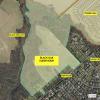Infrastructure projects prioritized in Dewey
Environmental experts and town leaders met in Dewey Beach May 12 to work on prioritizing a long and costly list of proposed infrastructure projects to improve water quality and alleviate flooding issues.
At the start of the infrastructure committee meeting, members voted unanimously to recommend town commissioners use $42,000 from the infrastructure fund to match $42,000 in realty transfer tax funding from Sussex County for infrastructure projects.
The town gave the county more than $1 million in transfer tax and is only getting $142,000 back in realty transfer tax funds, Zolper said, which the mayor is addressing with county officials. Funds must be used on infrastructure projects determined by the committee and approved by town commissioners, he said.
Commissioners are set to vote at their monthly meeting Friday, May 20, to approve projects using funds from Sussex County’s one-time realty transfer taxes and to appropriate $42,000 from the town infrastructure account as a match to the county funding.
Following the funding discussion, Center for the Inland Bays Director of Conservation and Watershed Planning Michelle Schmidt outlined a list of 30 proposed projects that would cost more than $8 million.
The town’s stormwater master plan was developed in 2017, she said, so the cost will likely be more due to inflation. Some infrastructure projects have been completed in a piecemeal way, she said, but an overall plan of prioritized projects including funding and a timeline would be the best way to accomplish goals.
Then, a short document could be produced to accompany the stormwater master plan and help guide project implementation for the next 10 years or so, she said.
The stormwater master plan, developed in partnership with CIB, the town and RK&K Civil Engineering, covers 152 acres and nine drainage basins, she said. Projects range from removing impervious surfaces and replacing them with previous materials, bioretention areas and living shorelines.
Schmidt grouped projects into high, medium and low priorities based on flooding, cost, nutrients, utility conflicts and property ownership, with 10 projects identified in each priority level.
High-priority projects would reduce nitrogen by 40% and cost $3.6 million, medium-priority projects would reduce nitrogen by 16% and cost $2.4 million, and low-priority projects would reduce nitrogen by 4% and cost $2.1 million, she said. Estimates do not include living shoreline projects, she said.
Most projects focus on replacing impervious surfaces with pervious pavers and mulch beds. Plans also call for the conversion of grass and curbed grass areas into bioretention areas.
The center is currently working to obtain funding for a living shoreline at Sunset Park that will include stabilizing the marsh, Schmidt said, and ongoing maintenance would need to be done by the town after projects are implemented.
Zolper said there is some difference of opinion as to who owns the wetlands between the Lions Club and Northbeach at the end of McKinley Street. Delaware Department of Natural Resources and Environmental Control said it was not sure who owned the area, Zolper said, which he finds hard to believe. Zolper said Todd Fritchman of Envirotech says DNREC owns the land.
It’s important to know who owns the area, Zolper said, so the town can work with DNREC on a permit to construct a swale to funnel water into the marsh area and out to the bay, which would help with rainwater but not major storm events. Water typically runs down Hayden Street, he said.
Schmidt said she would reach out to the state to find out who owns it. In a May 18 email, she said, she had contacted Delaware Department of Transportation and the Division of Water at DNREC and is waiting for an answer.
“It isn't a Sussex County parcel, so I am thinking that the state has to own it,” she said. “Just need to figure out which part of the state.”
The town currently has $720,000 in its infrastructure fund, which will be reduced when the town pays a $144,000 bill when work is sufficiently completed on a pipe reline and replace project, Zolper said. The infrastructure account receives funding from 20% of building permits, 5% of parking revenue, and 3% of transfer tax, he said.
Verizon 5G poles
As 5G poles are considered infrastructure, Zolper said, Verizon had submitted four applications to move poles currently on the beach dunes at Cullen, Clayton, Rodney and Collins streets, but not the pole on St. Louis Street. Applications are being reviewed by town wireless consultant CTC, Zolper said.
Verizon had installed the five poles on the beach dunes beginning in September 2020. In June 2021, Dewey residents Alex Pires, Diane Cooley and John Snow filed a class-action lawsuit against Verizon seeking to remove the poles on the beach and prevent Verizon from installing any more.
A November 2021 settlement reached by Verizon and Pires, Cooley and Snow determined the five poles would be removed from the dunes to locations approved by the town.


















































